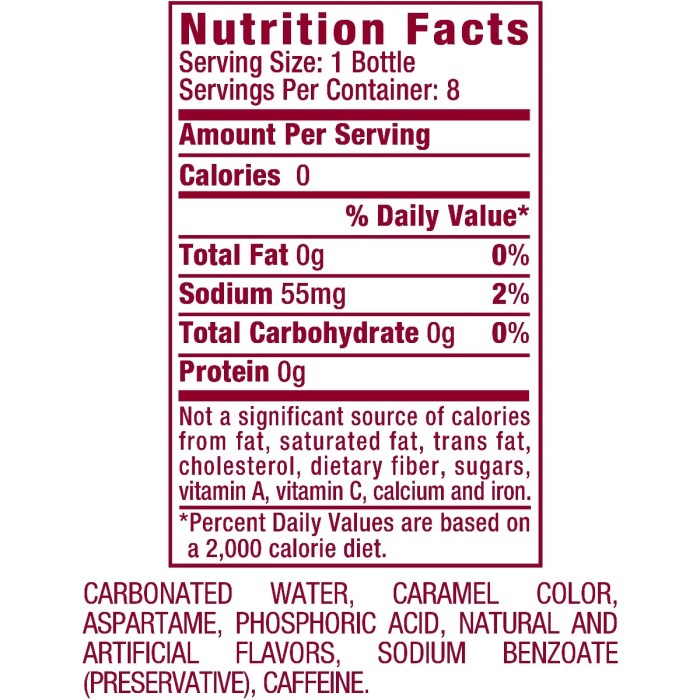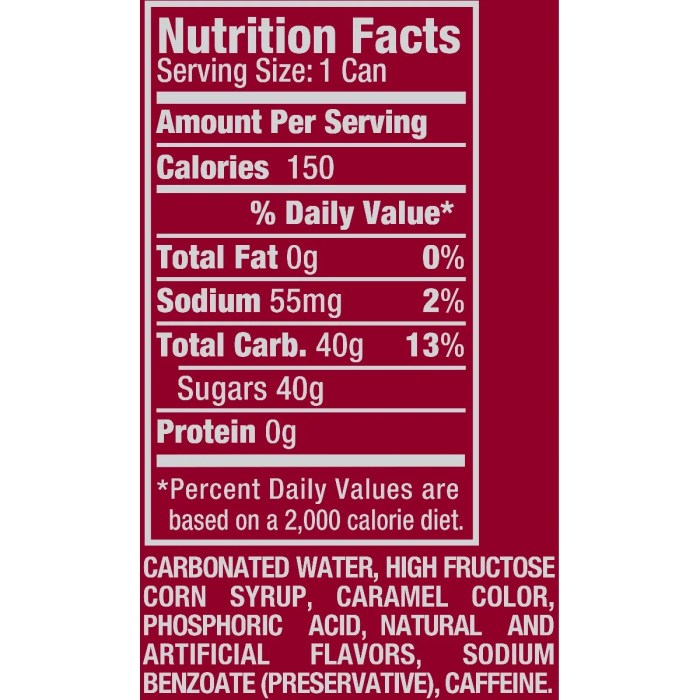Potential Health Effects & Considerations

Diet dr pepper nutrition facts – Regular consumption of Diet Dr Pepper, like any diet soda, presents a complex picture regarding its impact on health. While it avoids the immediate sugar rush and associated risks of regular soda, the long-term effects of artificial sweeteners and other ingredients remain a subject of ongoing research and debate. Understanding these potential effects is crucial for making informed choices about beverage consumption.
The short-term effects of Diet Dr Pepper are generally considered mild. Some individuals may experience digestive upset, such as bloating or gas, due to the artificial sweeteners. However, these effects are often temporary and vary considerably between individuals. In the long term, the concerns are more significant and revolve primarily around the potential metabolic impacts of artificial sweeteners and the overall dietary context of consuming such beverages.
Artificial Sweetener Risks and Metabolic Health, Diet dr pepper nutrition facts
Artificial sweeteners, such as aspartame and acesulfame potassium found in Diet Dr Pepper, have been linked to various metabolic concerns in some studies. While not definitively proven to cause weight gain in all individuals, some research suggests they may alter gut microbiota, potentially impacting glucose metabolism and insulin sensitivity. This could contribute to an increased risk of metabolic syndrome, type 2 diabetes, and cardiovascular disease over time.
Furthermore, the perception of sweetness without the accompanying calories might lead to increased cravings for sugary foods and hinder weight management efforts. It’s important to note that research in this area is ongoing and results are not always conclusive. The impact likely varies significantly based on individual factors such as genetics, overall diet, and lifestyle.
Comparison with Other Sugar-Free Beverages
Compared to other sugar-free beverages, Diet Dr Pepper’s health impact is neither uniquely beneficial nor exceptionally detrimental. Unsweetened tea and water remain the healthiest choices, providing hydration without added sugars or artificial sweeteners. Other sugar-free beverages, such as those sweetened with stevia or monk fruit, may offer potentially healthier alternatives, although long-term research on these sweeteners is still limited.
Understanding Diet Dr Pepper nutrition facts involves considering its high sugar content and artificial sweeteners. A contrasting nutritional profile can be found in whole grains, such as by reviewing details on rye bread nutrition facts , which often showcase higher fiber and complex carbohydrate content. Returning to Diet Dr Pepper, it’s crucial to remember that while it’s lower in calories than its sugared counterpart, it still lacks significant nutritional value.
Diet sodas, including Diet Dr Pepper, generally offer a similar level of potential risks associated with artificial sweeteners compared to other diet sodas, with differences stemming mainly from specific sweetener blends and additional ingredients.
Recommendations for Moderate Consumption
It’s crucial to remember that moderation is key. While Diet Dr Pepper might seem like a healthier alternative to regular soda, it’s not a health food. Excessive consumption of any artificially sweetened beverage can contribute to negative health outcomes.
- Limit consumption to occasional enjoyment rather than daily intake.
- Prioritize water and unsweetened beverages as the primary hydration sources.
- Consider healthier alternatives such as unsweetened tea, sparkling water, or beverages sweetened with natural sweeteners (in moderation).
- Pay attention to your body’s response. If you experience any digestive discomfort or other negative effects, reduce or eliminate consumption.
- Maintain a balanced diet and healthy lifestyle overall to mitigate any potential risks associated with artificial sweeteners.
Diet Dr Pepper vs. Other Diet Beverages: Diet Dr Pepper Nutrition Facts

Diet Dr Pepper, a prominent player in the diet soda market, occupies a unique space alongside other popular diet beverages. Understanding its distinctions in taste, ingredients, and overall health implications compared to competitors is crucial for informed consumer choices. This section will analyze Diet Dr Pepper’s position within the broader landscape of diet sodas.
Taste and Ingredient Comparison
Diet Dr Pepper’s distinctive 23 flavors set it apart from other diet sodas. While many diet sodas aim for a close approximation of their sugar-sweetened counterparts, Diet Dr Pepper embraces a bolder, more complex flavor profile. This is achieved through a specific blend of artificial sweeteners and flavorings, which differs significantly from the simpler sweetener profiles of other brands.
For instance, Diet Coke primarily relies on aspartame, while Diet Pepsi often uses a combination of aspartame and acesulfame potassium. Diet Dr Pepper, however, typically utilizes a blend including aspartame, acesulfame potassium, and sucralose, contributing to its unique taste. The precise formulation is proprietary, further highlighting its distinct character.
Artificial Sweetener Differences
The artificial sweeteners used in diet sodas significantly influence both taste and potential health effects. Aspartame, acesulfame potassium, and sucralose are the most common, each possessing a different sweetness profile and potential metabolic impact. Some individuals report experiencing different levels of aftertaste or other subjective sensory experiences depending on the sweetener blend. The absence of sugar in all these beverages is a shared characteristic, but the variety of artificial sweeteners employed leads to a diversity of flavors and potential health concerns, which require further investigation on a case-by-case basis.
Health Implications of Choice
Choosing Diet Dr Pepper over other diet options involves considering individual sensitivities to specific artificial sweeteners and overall dietary preferences. While all diet sodas lack the caloric density of their sugar-sweetened counterparts, some research suggests potential links between artificial sweeteners and long-term health outcomes. These findings are often debated and require further study, and the results are not always consistent across different sweetener types.
Therefore, the optimal choice depends on individual tolerance and preferences, with careful consideration of potential long-term effects being paramount. It is always recommended to consult a healthcare professional for personalized dietary advice.
Comparative Table of Diet Sodas
The following table summarizes key differences between three popular diet sodas: Diet Dr Pepper, Diet Coke, and Diet Pepsi.
| Feature | Diet Dr Pepper | Diet Coke | Diet Pepsi |
|---|---|---|---|
| Primary Artificial Sweetener(s) | Aspartame, Acesulfame Potassium, Sucralose | Aspartame | Aspartame, Acesulfame Potassium |
| Flavor Profile | Complex, 23 flavors | Classic cola | Classic cola |
| Calories | 0 | 0 | 0 |
| Sodium (mg) |
Questions and Answers
Does Diet Dr Pepper contain any caffeine?
Yes, Diet Dr Pepper contains caffeine, although the exact amount may vary slightly depending on the serving size and production batch.
Are there any known long-term side effects associated with consuming artificial sweeteners?
Research on the long-term effects of artificial sweeteners is ongoing and inconclusive. Some studies suggest potential links to metabolic issues, while others find no significant harm. More research is needed to definitively determine long-term effects.
How does Diet Dr Pepper compare to other diet colas in terms of taste?
Taste is subjective. Diet Dr Pepper has a unique, complex flavor profile distinct from other diet colas, often described as spicier and more intensely flavored. Consumer preference will vary.
Is Diet Dr Pepper suitable for people with diabetes?
While Diet Dr Pepper is calorie-free and sugar-free, individuals with diabetes should still consult their doctor or a registered dietitian before incorporating it into their diet. Managing blood sugar levels requires a holistic approach, and individual needs vary.
